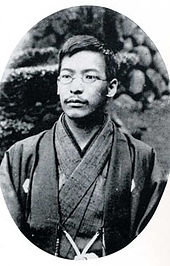Kambara Ariake
Kambara Ariake ( Japanese 蒲 原 有 明 , actually: Kambara Hayao ( 蒲 原 隼 雄 ); born March 15, 1876 in Tokyo ; † February 3, 1952 ) was a Japanese poet.
Life
Kambara began to write poetry as a teenager under the influence of the verses of Byron and Heine . After graduating from Kokumin Eigakkai , an English school in Tokyo, he founded the literary magazine Ochibo Zoshi ( 落 穂 双 紙 ) with Hayashida Shunchō and Yamagishi Kayō . Here his first novel Aki no Yamazato appeared . With a second novel, Daijihi , he won a prize in the literature competition of the newspaper Yomiuri Shimbun in 1898 .
After that, Kambara turned entirely to poetry. Under the influence of the works of English poets such as John Keats and Dante Gabriel Rossetti , poems based on the Kojiki and Fudoki were created , which appeared in several collections of poetry from 1902 onwards. In the Ariake Shū collection (Ariake's collection) he introduced the European form of the fourteen-line sonnet into Japanese poetry. Along with Susukida Kyūkin, he became the most important representative of symbolism in Japan.
literature
- Arata Takeda : Exuberance through excess (PDF; 311 kB) in: Sommergras (magazine of the German Haiku Society ), p. 14 f.
Web links
| personal data | |
|---|---|
| SURNAME | Kambara, Ariake |
| ALTERNATIVE NAMES | 蒲 原有 明 (Japanese, pseudonym); Kambara Hayao (real name); 蒲 原 隼 雄 (Japanese, real name) |
| BRIEF DESCRIPTION | Japanese writer |
| DATE OF BIRTH | March 15, 1876 |
| PLACE OF BIRTH | Tokyo |
| DATE OF DEATH | 3rd February 1952 |
